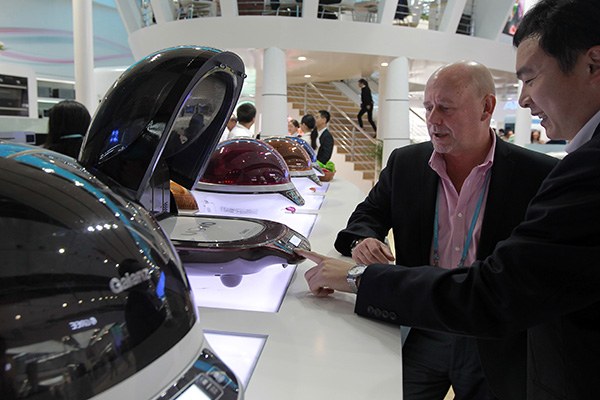
A Galanz Electrical Appliances Ltd representative introduces the firm’s newly developed microwave ovens to an overseas buyer at the Canton Fair. [Photo/China Daily]
Only 88,998 overseas buyers visited the autumn session of the biannual Canton Fair in the first three days, down 4 percent year-on-year. And that is not a good sign, aver the organizers of China’s largest trade event, formally known as the China Import and Export Fair.
For, it could herald a grim time for thousands of Chinese exporters in the months to come. The Canton Fair, which opened on Oct 15 in Guangzhou, the capital of Guangdong province, and will close on Nov 5, is seen as a barometer of China’s foreign trade.
According to the General Administration of Customs, China’s trade dropped 7.9 percent year-on-year in the first nine months, with exports down 15 percent.
According to Xu Bing, spokesman for the fair, the overall picture for Chinese exporters may not be bright due to lower prices and weak external demand, not very different from the country’s trade performance in the first three quarters of this year.
But not everyone among Chinese manufacturers agrees. Chen Zili, public affairs manager with Gree Electric Appliances Inc, a leading home appliances manufacturer based in Zhuhai, Guangdong province, believes the trade situation would not be so tough as the company has relied more on innovation to sustain its business growth.
“Chinese home appliance makers, focusing on technology innovation and self-developed brands, will see a steady growth of demand in the overseas market,” Chen said.
According to Chen, Gree lowered its production capacity due to an oversupply of air conditioners and a tough pricing competition since early this year. “Instead, we focused on technology, innovation and promoting brands in the overseas market, which have already helped us gain a bigger market share.”
Gree has launched zero-energy consumption air conditioners in several overseas countries and regions since early this year. “The backbone zero-energy consumption units have helped us expand sales overseas,” said Chen.
The product, named VRF photovoltaic unit, is a combination of photovoltaic power-generation and home appliance. It also serves as a power station that is able to generate energy for all of a household’s appliances.
“For many years, overseas buyers were more familiar with small and lower-quality air conditioners produced by Chinese manufacturers. But now they have seen that we are able to produce advanced and human-oriented products,” said Chen.
Gree’s units have taken up to 60 percent market share in some countries in Asia and South America, said Chen. “In Brazil, Gree is a widely recognized international brand. And we have developed an increasing share in Pakistan and Malaysia.”
Gree, which has already set up a factory in Brazil, is looking for opportunities to open more processing facilities in overseas markets to better cater to local demand, said Chen. “We are also developing the second and third generations of the photovoltaic units, which would help us expand overseas business in the near future.”
A growing number of international buyers attending the Canton Fair have noticed the trend of Chinese exporters highlighting innovation and brand building. In this regard, information technology companies such as computer maker Lenovo Group and smartphone maker Huawei Technologies stand out.
Agrees Sohil Sagar, a buyer from India. “Chinese manufacturers have become more aware of building brands and upgrading products by introducing innovative technologies and enhancing after-sales service.”
Sagar, a representative of a trade agent, has been visiting the trade event for more than 10 years now. He said products with high quality and superior design would be more popular in the Indian market.
He said Chinese porcelain products are no longer considered ordinary in India. “The market demand is certainly dropping due to global economic slowdown, but products with higher quality and distinguished designs will still sell,” said Sagar.
A decade back, Chinese manufacturers believed in slashing prices to gain market share amid intense industrial competition at home and abroad, said Li Xinghao, founder and CEO of Guangdong Chigo Air Conditioning Co Ltd.
“But now, we are no longer relying on lower prices to boost sales as we have attached more importance to quality by introducing smart solutions to the traditional air conditioning products,” said Li.
“As global demand shrinks, we need to tell our international customers that Chinese products are no longer ordinary and low-priced. Chinese products should be labeled as having good quality,” Li said.
According to the customs statistics, China’s home appliance exports dropped by 0.2 percent year-on-year to $28.9 billion in the first half of 2015.
In sharp contrast, Chigo, which was established in 1994, reported a year-on-year increase of more than 20 percent in sales in August, according to Li. In the first eight months of the year, Chigo’s sales increased by more than 10 percent year-on-year.
“We will not be involved in pricing competition. Instead, we are focusing on adding value to our products, which means we are increasing the efficiency of processing, boosting product quality and introducing advanced technologies,” Li said.
